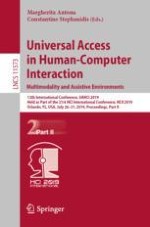2019 | OriginalPaper | Buchkapitel
Taking Neuropsychological Test to the Next Level: Commercial Virtual Reality Video Games for the Assessment of Executive Functions
verfasst von : Federica Pallavicini, Alessandro Pepe, Maria Eleonora Minissi
Erschienen in: Universal Access in Human-Computer Interaction. Multimodality and Assistive Environments
Aktivieren Sie unsere intelligente Suche, um passende Fachinhalte oder Patente zu finden.
Wählen Sie Textabschnitte aus um mit Künstlicher Intelligenz passenden Patente zu finden. powered by
Markieren Sie Textabschnitte, um KI-gestützt weitere passende Inhalte zu finden. powered by
